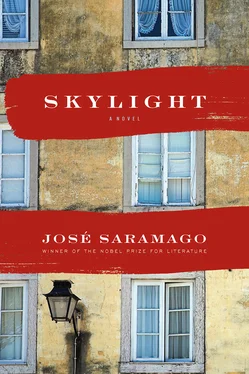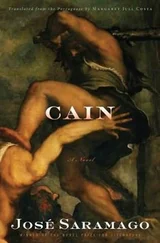These thoughts clouded her happiness. She would, of course, leave anyway, but the temptation not to come back made her happiness almost painful. Would it not be the worst of punishments to have to return to Lisbon after three months of freedom? To condemn herself to spending the rest of her life putting up with the presence and the words, the voice and the shadow, of her husband, would that not be like going down into hell again after having regained paradise? She would have to fight constantly to keep her son’s love. And when her son (Carmen’s imagination vaulted over the years) — and when her son married, it would be even worse because she would have to live alone with her husband. Everything would be resolved if he would agree to a divorce. But what if, on a whim or out of sheer malice, he forced her to return?
All day she was tormented by these thoughts. She had forgotten the good times in their marriage, of which there had been a few. She could think only of Emílio’s cold, ironic gaze, his censorious silence, his permanent look of a man who has failed and doesn’t care who knows it, who makes of his failure a placard that everyone can read.
Night fell without her having moved a step closer to finding answers to the questions that kept surfacing in her mind. She was so silent that her husband asked if something was worrying her. No, nothing, she said. She was just excited about their imminent departure. Emílio understood and did not insist. He felt excited too. In a few hours’ time he would be free. Three whole months of solitude, freedom and an unencumbered life…
They left the next day. All the neighbors knew they were leaving and almost all came to the windows to watch. Carmen said goodbye to those neighbors with whom she was on good terms and got into the car with her husband and son. They reached the station shortly before the train was due to leave. They just had time to put the luggage on board, take their seats and say their farewells. Henrique barely had time to cry. The train vanished into the mouth of the tunnel, leaving behind it a cloud of white smoke that dissolved into the air, like a white handkerchief swallowed up by the distance.
It was his first day of freedom. Emílio wandered the city for hours. He discovered places he had never known existed, had lunch in a cheap restaurant in Alcântara and looked so happy that the owner charged him double for the meal. Emílio uttered not a word of protest and even left a tip. He caught a cab back to the Baixa, bought some foreign cigarettes and, when he walked past an expensive restaurant, cursed himself for having had lunch at that other, cheaper place. He went to the movies and, during intermission, drank a coffee and struck up a conversation with a stranger who, on the subject of coffee, discoursed at length on his terrible stomach problems.
When the film ended, he followed a woman out into the street, but soon lost sight of her, not that he cared. He stood on the pavement, smiling up at the tall monument in Praça dos Restauradores. In one leap, he thought, he could reach the very top, but he didn’t make that leap. He spent more than ten minutes watching the traffic policeman and listening to his whistle. He found everything amusing and looked at people and things as if seeing them for the first time, as if he had recovered his sight after years of blindness. Approached by a young man trying to persuade passersby to have their photo taken, he promptly agreed. He took up his position and, at a signal from the photographer, walked straight ahead, with a determined step and a smile on his face.
He had dinner that night at the expensive restaurant. The food was good, so was the wine. He had very little money left after all these extravagances, but he didn’t regret it. He didn’t regret anything. He had done nothing that merited any feelings of regret. He was free, not as free as the birds, who have no obligations or duties, but as free as he could hope to be. When he left the restaurant, all the neon signs in the Rossio were blazing out. He looked at them, one by one, as if they were the stars of the Annunciation. There was the sewing machine, the two watches, the glass of port wine that emptied of its own accord, the carriage that never went anywhere, with its two horses, one blue, one white. And down below were the two fountains with their fishtailed ladies holding cornucopias so parsimonious that only water poured forth from them. And there were the statue of Emperor Maximilian of Mexico and the columns of the Teatro Nacional, and the cars trundling over the tarmac roads, and the cries of the newspaper vendors and the pure air of freedom.
He returned home late, feeling slightly weary. The few glum streetlamps cast only the dimmest of lights. All the windows were closed and dark. As were his.
When he opened the door, he was immediately aware of the uncanny silence. He walked from room to room, leaving the lights on behind him and the doors open, like a child. Not that he was afraid, of course, but the stillness, the absence of familiar voices, the vaguely expectant atmosphere, made him feel uneasy. He sat down on the bed of which he would be the sole occupant for the months of May, June, July and possibly part of August. What better time to savor freedom! Sun, heat, fresh air. He would go to the beach every Sunday and lie in the sun like a lizard just woken from its winter sleep. He would stare up at the cloudless blue sky. He would take long walks in the countryside. The woods of Sintra, the Castelo dos Mouros, the beaches on the opposite shore. He would do all these things alone. All that and more, things he could not even imagine now, because he had lost the habit of imagining. He was like a bird who, on seeing the cage door open, hesitates before making the leap that will carry it beyond the bars.
The silence in the apartment closed about him like a hand. All his plans, whatever they might be, would have to be paid for. He had to work very hard and that would eat up his time. But he would work more enthusiastically, and if he had to cut back on anything it would be food. He now regretted the expensive supper and the foreign cigarettes, but it was, after all, only the first day, and it was natural that he should get carried away. Others, in his place, might have done much worse.
He got up and went to turn out the lights before returning to bed. He felt bewildered, like someone who has won the lottery and doesn’t know what to do with the money. He discovered that, having achieved his longed-for freedom, he now had no idea how to enjoy it. The plans he had made earlier seemed paltry and frivolous. He would simply be doing alone what he had done with his family. He would be visiting the same places, sitting under the same trees, lying on the same sand. That wasn’t good enough. He had to do something more important than that, something he could look back on when his wife and son returned. But what? Orgies? Drunken sprees? Love affairs? He had experienced those things when he was single, and had no desire to revisit them. He knew that such excesses always leave a bitter, melancholy aftertaste of regret. To repeat them would be to sully his freedom. However, apart from going on a few outings and indulging his baser instincts, he couldn’t see how else to fill the months that lay before him. He wanted something loftier, more dignified, but didn’t know what that might be.
He lit another cigarette, then got undressed and lay down on the bed. There was only one pillow: it was as if he were a widower or a bachelor or divorced. And he thought: “What am I going to do tomorrow? Well, I have to go to the shop. In the morning I’ll do a round of my customers. I need to get some really substantial orders in. And in the afternoon? The movies perhaps? No, that’s a sheer waste of time. There are no films worth watching. But if I don’t go to the movies, where will I go? For a walk, I suppose, somewhere or other. But where? Lisbon is a city where you can only really live if you’ve got plenty of money. If you don’t, then you have to work to fill up the time and earn enough to eat. And I don’t earn that much. And at night? What will I do at night? The movies again? Great! It looks like I’m going to spend my days watching films, as if there were nothing else to see or do! And what about money? Just because I’m on my own doesn’t mean I can stop eating and paying the rent. I’m free, yes, but what’s the use of freedom if I don’t have the means to make the most of it? If I continue in this vein, I’ll end up wishing they were back…”
Читать дальше












